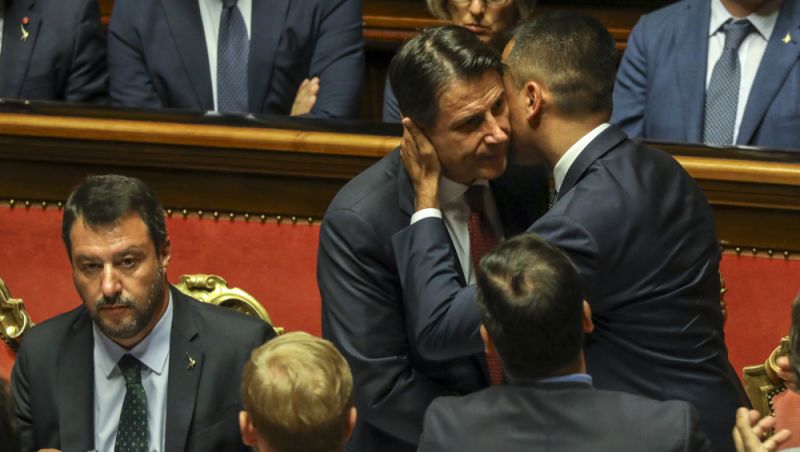

(Bloomberg Opinion) — If you want a powerful depiction of the sorry state Italian politics is in, look no further than the parliamentary debate that led to the resignation of Prime Minister Giuseppe Conte.
It was a festival of hypocrisy staged by three political leaders: Matteo Salvini, the hard-right deputy prime minister who wants to take the country to an election; Matteo Renzi, the former prime minister who wants a government of national unity; and Conte himself. The three attacked each other for about an hour on Tuesday – and left Italians no wiser about where their country is headed.
Conte was first up, announcing he plans to tender his resignation to President Sergio Mattarella. He then took the opportunity to lay into Salvini, who this month decided to pull the plug on the coalition government.
The prime minister accused his deputy of putting his own political interests ahead of those of the country and of betraying the contract between the League and Five Star Movement. Conte said Salvini should respond to allegations he received illicit funds from Russia. And added, for good measure, that politicians should care less about social media – a clear attack on Salvini’s obsessive Facebook and Twitter presence.
And yet, Conte only seems to have discovered all these problems after more than 14 months in coalition government. The technocratic prime minister had previously largely avoided attacking his deputy’s behavior – even when it created controversy in Europe.
Conte’s defense of his own government was also flimsy: Whatever one makes of Five Star and the League, it is clear they delivered on very few of the gigantic promises they had made, including a 125 billion-euro ($139 billion) spending plan.
Then came Salvini, giving his first speech as the de facto leader of the opposition. It isn’t clear what will happen in Rome after Conte steps down, but one possibility is that Five Star will form a coalition with the center-left Democrats.
Salvini said he wants Italy to be free from the control of the European Union and called for at least 50 billion euros of tax cuts in the next budget. He also made a last-ditch attempt to patch up relations with Five Star, saying the parties could pass a budget together and then go to the polls. This marked a softening of his stance, which had been to call for an immediate general election.
Salvini spoke much more to his voters than to lawmakers. He touched on all the issues which he knows can inflame his base – from immigration to the EU. He even pulled out a rosary. But he failed to explain why he didn’t deliver on his pledges having just spent more than a year in government.
His defense – that his allies stopped from doing things – seemed at odds with his depiction as Italy’s strongman. Salvini’s calls for a renewed, if temporary, alliance with Five Star only suggest he is getting increasingly concerned he could soon find himself out of government having botched his attempt to grab power.
Finally, it was the turn of the opposition. Renzi, who is no longer the leader of the center-left Democrats but still hopes to reclaim the political limelight, played the part of the elder statesman. He warned of trade wars and of an incoming recession, and advocated a grand coalition to avoid an increase in value-added tax, something which is set to kick in next year unless explicitly ruled out in the budget.
But for all his jokes, he sounded unconvincing. It isn’t at all clear how a government of Five Star and the Democrats could breathe new life into Italy’s economy in the context of such a precarious fiscal outlook. Renzi also faces resistance within his own party; some supporters fear this is all just a ploy to buy him time and a return to the main political stage.
If this were a theatrical performance – or an episode of an Italian version of House of Cards – it would be hugely entertaining. But with the economy stagnating and a deeply disenchanted electorate, it is depressing to see a political class acting so cynically.
The coming days will decide whether Italy gets a technocratic caretaker administration, a new governing coalition, or fresh elections. Only one thing is certain: the country’s deep political and economic crisis won’t be over anytime soon.
To contact the author of this story: Ferdinando Giugliano at [email protected]
To contact the editor responsible for this story: Edward Evans at [email protected]
This column does not necessarily reflect the opinion of the editorial board or Bloomberg LP and its owners.
Ferdinando Giugliano writes columns on European economics for Bloomberg Opinion. He is also an economics columnist for La Repubblica and was a member of the editorial board of the Financial Times.
<p class="canvas-atom canvas-text Mb(1.0em) Mb(0)–sm Mt(0.8em)–sm" type="text" content="For more articles like this, please visit us at bloomberg.com/opinion” data-reactid=”40″>For more articles like this, please visit us at bloomberg.com/opinion
©2019 Bloomberg L.P.











Add Comment